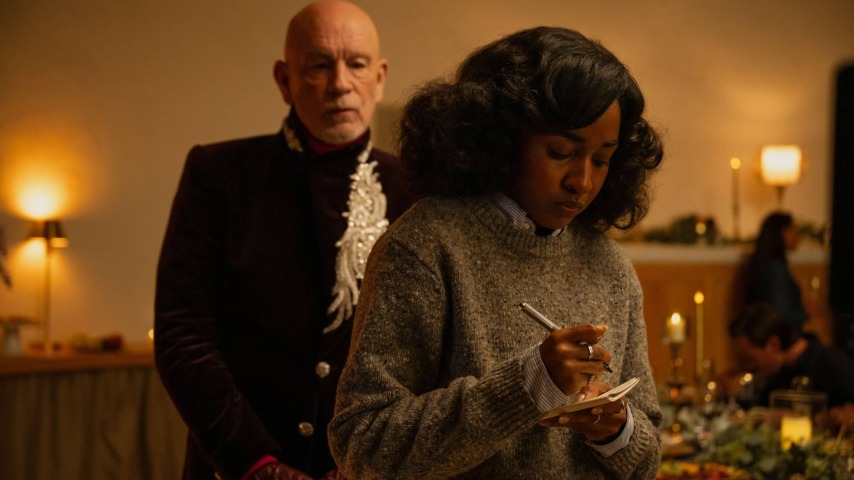It's a pop star vs. critics in the scattered cult horror Opus
Ayo Edebiri and John Malkovich square off in a culty film that needs far more focused ideas.
Photo: A24
In one of the final scenes of Opus—the feature debut of writer/director Mark Anthony Green—the calmly deranged pop-star-turned-cult-leader Alfred Moretti (John Malkovich) sits down to talk with Ariel Ecton (Ayo Edebiri). He explains why he initially chose the fledgling culture journalist two years ago to be like a lamb to the slaughter for his new album “listening party” that turned out to be a little something more. Ariel, as a friend had described her in one of the film’s opening scenes, was like a vessel. She had no experience yet, and thus she had no perspective. She was uncorrupted by the siren call of clickbait and optimized SEO, and wasn’t a sycophantic devotee, of which Moretti had many. Two years ago, she was just a young writer trying to get her foot in the door with a big story about a pop star, trying to ride the coattails of her editor Stan (Murray Bartlett). Now, she is a star in her own right after penning her exposé. Of course, no matter the consequences Moretti might face, he’s still more of a beloved icon and artist than Ariel could ever hope to be.
What is Green trying to say about art and arts criticism through Opus, a film about a group of culture commentators who are invited to gather at a pop star’s secret compound, where he intends to do away with them one by one? If it doesn’t feel obvious enough for the average viewer, Charli XCX was once photographed wearing a shirt that read “They don’t build statues of critics,” which would seem to get the point across a little more efficiently. However, Green is also evidently not just trying to opine against contemporary arts criticism. Green directs his frustrations and interests at a little bit of everything in Opus: fan culture, the absurdity of modern celebrity, the death of culture journalism, and what it takes to be a successful writer in today’s climate.
It’s more than just a shock to Ariel when she receives a lavish gift basket inviting her to join other select guests for an ultra-exclusive listening party of Caesar’s Request, the first album in 30 years from Moretti, the most venerated musician of the ‘90s. Ariel knows it’s an opportunity. She has felt underutilized at her job, yearning for her breakout moment to propel her into journalistic success and eventually lead her to multiple books deals—and yet she has a staff job at a culture magazine, which is more implausible by today’s standards than a celebrity going full cult leader. Perhaps, though, this kind of adventure would help give her writing some much-needed depth. She accompanies Stan alongside four other critics, commentators, or influencers, including Clara Armstrong (Juliette Lewis), a pop news host who refers to Moretti half-mockingly as “The Bald Genius.”
Whisked away by plane and then by bus to a secretive enclave (but not so secret that there aren’t fans huddled desperately at the gates), Ariel is the only one of her group to feel her hackles rise upon setting foot on the compound. Having read from the religious text on a movement called “The Level” that was included in her gift basket, she clocks that the blue-clad residents which comprise most of the compound are actually disciples of Moretti’s spiritual clan. No one else is surprised or even ill at ease from this revelation—Moretti has always been a larger-than-life eccentric, of course he would form a cult years after his peak. “Teach them young, and the world will be yours,” is the Levelists’ maxim; young children can be seen scampering around at the first dinner Ariel attends. There, to her great disgust, a loaf of bread is shared among dinner guests until it reaches her as a soggy, glutinous wad.








































